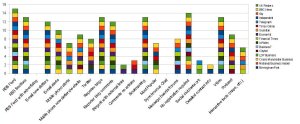Ok, so this is something I’ve never done before (and it may get me in trouble).
Below is a copy of the (unsubbed) version of my column that will go into The Birmingham Post tomorrow.
I wanted to put it here so that people could add comments to it and I could link to it in Del.icio.us before the article was published.
As was pointed out to me, 600 words is never enough, and there is a lot I’ve missed out. So please help me add to it!
There is something I want to share with you. Something that I don’t think a lot of people know:
Journalists are people too.
They are. Honest!
But I doubt you’ll believe me. I am, after all, a journalist.
As a collective body, we seem to be ranked in the public consciousness as something akin to pond life… except a little less trustworthy.
There are numerous surveys placing journalists amongst the ranks of used-car salesmen, estate agents and, heavens forfend, politicians when it comes to trust.
Yet there are many that joined journalism because they wanted to be the trusted, responsible champion of the people.
So what makes people so convinced that, at the drop of a hat, us reporters are willing to lie, cheat and sell our grandmothers for a story?
A straw poll of contacts and friends on micro-blogging service Twitter (an interesting platform that I will delve into more on in a future column) offered up a few explanations:
-
“Because some of them are plain untrustworthy – remember Hillsborough and Viglen?”
-
“Most who’ve had an article written about them can see how many mistakes get made.”
-
“Because when you have a 600 word limit something always gets left out.”
-
“Lack of accountability.”
-
“Tabloid digging into private lives.”
These show, collectively, we journalists have a long way to go before we are considered even as trustworthy as the ordinary man on the street.
But it is the man on the street that journalists have to worry about in the shiny new world of digital media.
In March, I was lucky enough to be part of a small team of young, West Midland “media types” sent to the SXSW Interactive conference in Austin, Texas, by Advantage West Midlands-funded project Digital Central.
The conference, which originally started as a music festival, is fast becoming known as a premier event attracting the top international talent in digital media.
My fellow attendees were all “early adopters”. Whether they be housewives, techies or students, they are the ones surfing the crest of the digital wave, the first to adopt all the new and shiny tools and applications that the web has to offer.
Many of them write blogs or produce their own videos, but what shocked me was the ability of some of them to command audiences in the thousands or tens of thousands.
When I asked them how they did it, the answer was pretty uniform: They were trusted and they were “part of a conversation”.
This conversation may be had through blogs, video or audio podcasts, but the fundamental idea is that their audience has redress and can correct and build upon the original work.
By opening up in this way, and by acknowledging their readers as real people, they show themselves to real too – something journalists have avoided in the pursuit of an ideal of objectivity, or a belief that their opinions and writing should command authority.
But these digital pioneers shaping a future for online media are demonstrating that, above all, trust is where it’s at.
The old model of distance between journalist and reader is going to have to change.
It is something The Birmingham Post has been investigating over recent months with the launch of its blogs, its experimentation with social bookmarking service Del.icio.us and Twitter.
By realising that they are just one – hopefully well-researched, well-written and interesting – part of a bigger conversation, journalists have a chance of raising themselves out of the pond and – hopefully – becoming seen as the trusted champions they really should be.
To see some of the websites that helped to inform this column or to respond, please visit http://del.icio.us/joannageary/column2






